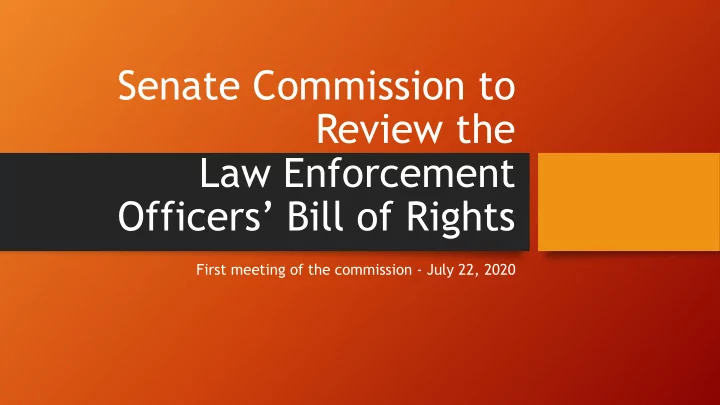

Senate Commission to Review the Law Enforcement Officers’ Bill of Rights First meeting of the commission - July 22, 2020
Membership and Scope of Commission • Thirteen members, including members of the senate, the public, state and local law enforcement agencies, and representation from our rank and file officers. • This group is tasked with making recommendations on reforming and improving the Law Enforcement Officers’ Bill of Rights over the next several months in order to present draft legislation. • You have been asked to consider among other items, the rights of our citizens, the employment rights of officers, and measures to increase: • Accountability • Diversity in law enforcement agencies • Policies to enhance police-community relations • Training for greater cultural understanding
Legislative history of LEOBOR in Rhode Island • The Law Enforcement Officers’ Bill of Rights (42-28.6) was adopted in 1976. • At the time, LEOBOR sought to balance the constitutional due process rights of officers with management rights and transparency. • LEOBOR and its provisions take effect when an officer is “under investigation or subjected to interrogation by a law enforcement agency, for a non-criminal matter which could lead to disciplinary action, demotion, or dismissal…” (R.I.G.L. 42-28.6-2)
1995 Review by Senate and House City/Town A B C D E F 1. Establish maximum time limits for the selection of panel members, commencement, conduct and State Police 58 55 3 1 1 0 conclusion hearings. 2. Change to the existing appeal procedure to equalize rights of agency and officer. Locals 555 512 33 18 7 6 3. Change the law as related to secrecy to allow for release of information to the public. A. Total number of discipline cases, including reprimands for the last three years. 4. Provide procedures and clarification as to a law enforcement agency’s right to suspend an officer. B. Total number of discipline cases that did not result in hearing under the provisions of the Bill of Rights for the 5. Allow for the discharge of an officer convicted of a felony or who pleads guilty or no contest to a last three years. felony charge. C. Total number of discipline cases that resulted in hearings 6. The elimination of the two-day summary under the provisions of the Bill of Rights for the last three punishment from LEOBOR; and subject it to years. existing contractual agreements. D. Total number of cases resulting in findings of guilt by 7. Composition of a Hearing Panel to establish a hearing panel for the last three years. neutral members on the panel to serve as Chairperson, including a process for the Presiding E. Total number of cases resulting in findings of not guilty Justice of Superior Court to select panel members for the last three years. from a pre-submitted list that can include law enforcement retirees. F. The total number of cases dismissed.
Possible Areas to Focus 1. Composition of hearing panel. 2. Summary Discipline period beyond 2 days. 3. Prohibition on public statements. 4. Streamline procedures while protecting procedural due process. 5. Enhanced data gathering, transparency, and oversight.
Recommend
More recommend